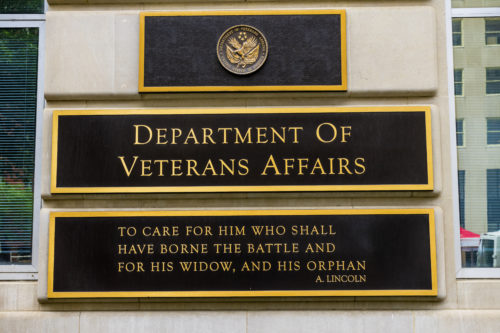Outrage of the Month: VA Hospitals Concealed Information About Dangerous Health Care Practitioners
Health Letter, November 2017
By Michael Carome, M.D.

If you’re not outraged,
you’re not paying attention!
Read what Public Citizen has to say about the biggest blunders and outrageous offenses in the world of public health, published monthly in Health Letter.

When a hospital concludes that one of its health care practitioners poses a danger to patients and therefore should no longer be allowed to deliver medical care, it has an ethical obligation to share that information with appropriate authorities and other hospitals and medical facilities where that practitioner may seek employment in the future.
But the U.S. Department of Veterans Affairs (VA) — the largest employer of health care professionals in the U.S. — apparently considers itself exempt from this obligation. According to a damning expose published last month by USA Today, the VA “has for years concealed mistakes and misdeeds by [hospital] staff members entrusted with the care of veterans,” thus allowing hospitals and clinics outside the VA system to unwittingly hire dangerous health care practitioners.
For example, the USA Today investigation found cases where VA hospitals did not report to the National Practitioner Data Bank (NPDB) disciplinary actions taken against health care practitioners. The NPDB, which began operating in 1990, helps to ensure patient safety by providing a comprehensive clearinghouse of information concerning the malpractice payment and disciplinary history of physicians, dentists and other health care practitioners. State licensing boards and hospitals routinely query the NPDB to screen health care practitioners who are seeking licensure or employment.
Under federal law, hospitals must report to the NPDB any adverse action against a physician or dentist — such as a suspension or revocation of clinical privileges — that lasts more than 30 days. Reporting such disciplinary action against other health care practitioners, including nurses, podiatrists and psychologists, is optional under the law, but many institutions submit such reports. By not reporting disciplinary actions taken against health care practitioners who deliver negligent or substandard care, the VA makes it easier for them to get jobs caring for patients elsewhere.
Even more troubling, USA Today identified numerous cases where VA hospitals signed secret settlement agreements with doctors, nurses and other health care practitioners who had been forced out of the VA that contained “promises to conceal serious mistakes” — including dangerous medical errors. In more than 120 cases involving secret settlement agreements from 2014 and 2015, the VA initially had found that the practitioners’ mistakes and misdeeds were so serious that they should be fired, but in nearly three-quarters of those settlements, the VA agreed to remove negative information from personnel files or give neutral or positive references to prospective employers of the practitioners.
In one particularly chilling case that was documented by USA Today, a podiatrist practicing at the Togus VA Medical Center in Augusta, Maine was found to have botched surgeries in 88 veterans. The podiatrist operated on patients who didn’t need surgery, drilled the wrong screw into the bone of one patient and severed a critical tendon in another. One patient left with debilitating pain following two failed ankle surgeries by the podiatrist chose to have her lower leg amputated. In a deposition for a federal lawsuit, a former chief of surgery at the Togus VA Medical Center stated that “We found that [the podiatrist] was a dangerous surgeon.” USA Today reported, however, that VA officials allowed the podiatrist to quietly resign and for years did not disclose his medical errors to patients whom he had injured or to state regulators who licensed him. That podiatrist now clinically practices in New York City.
By concealing the medical mistakes and misdeeds of dangerous health care practitioners, VA officials are complicit in the harms that these practitioners cause when they move on and resume clinical practice at other hospitals and clinics. To protect patients around the country, the VA must immediately abandon its entrenched policy of concealment and implement a policy of robust transparency whenever it decides a health care practitioner is too dangerous to practice within the VA health care system.